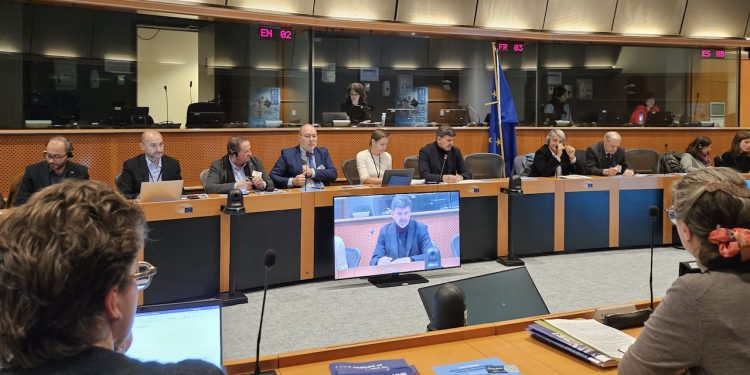The EU Social Partners in the fisheries sector – Europêche and the European Transport Workers’ Federation (ETF) – have presented the results of a major initiative aimed at creating a safer, healthier, and more worker-friendly fisheries sector across Europe. The dissemination conference at the European Parliament hosted by MEPs Nicolás González Casares (Socialists and Democrats) and Paulo do Nascimento Cabral (European People’s Party), provided an opportunity to showcase innovative tools developed under the EU project Pillars of the Sea 3: Roadmap towards socially sustainable fishing.
With the support from the European Commission, Pillars of the Sea 3 united industry specialists and stakeholders to deliver actionable solutions that address social sustainability in the fisheries sector. The initiative, part of the European Social Dialogue for Sea Fisheries, emphasises fair recruitment, worker safety, occupational health, and effective communication for multinational crews, paving the way for a safer and more worker-friendly industry worldwide.
Key Areas of Focus for Pillars of the Sea 3 include trade measures to combat forced labour in fisheries. The project has examined the potential for EU customs authorities to restrict seafood imports from vessels or countries with documented labour abuses, including forced and child labour. This effort seeks to protect human rights and foster sustainable practices throughout the seafood supply chain, in line with the EU’s Farm to Fork Strategy.
Guidelines for fair recruitment of migrant fishers are also on the agenda as this pillar provides comprehensive guidelines for fishing companies and crew agencies to promote ethical recruitment practices and uphold workers’ rights as well as model contracts of employment based on EU legislation and international labour standards. These guidelines aim to enhance transparency in hiring and to attract skilled young professionals to the fishing industry.
Addressing fishers’ specific occupational health needs, the project developed a training program for medical practitioners authorised to conduct mandatory medical exams for fishers under ILO’s Work in Fishing Convention (C188). This programme ensures that practitioners can identify and manage the unique health risks associated with fishing. Based on feedback from stakeholders, the project enhanced the Fishery Speak mobile application, a mobile glossary of essential maritime terms, by adding new languages and functionalities. These updates improve communication among multinational crews, contributing to safety and effectiveness on board.
The conference, held at the European Parliament, underscored Europêche and ETF’s commitment to advancing the Common Fisheries Policy’s social objectives. With the European Commission’s support, this project tackles labour rights, ethical recruitment, occupational health, and the global fight against forced labour, setting a new standard for socially responsible and sustainable fishing practices.
EP Support
The social Partners expressed appreciation for the European Parliament’s support, particularly from MEPs Casares and Cabral, in highlighting essential advancements and tools designed to strengthen fair labour practices, safety, and health standards within the EU fishing industry and beyond. The sector also aims to foster socially responsible fish sourcing and consumption within the EU market.
‘We invite policymakers to use the tools and policy recommendations developed under this initiative to continue advancing the social dimension of fisheries and ensure comprehensive sustainability across the EU,’ a representative of the social partners said.
With strong participation from the International Labour Organization (ILO), the conference highlighted the project’s global impact on fishers’ health and safety. The ILO Director for the EU, Verboven, closed the event, underscoring a shared commitment to improving working conditions at sea. Representatives from ILO’s EU and international offices attended, showing support for the project’s health initiatives.
In an earlier phase, the EU Social Partners, in collaboration with the International Maritime Health Association (IMHA), developed vital guidelines for fishers’ medical exams, which the ILO and International Maritime Organization (IMO) officially adopted in February. Building on this success, the new project phase offers a dedicated Training Programme for medical practitioners, helping them conduct fitness exams required under the ILO’s Work in Fishing Convention (C188). With the IMO’s upcoming revised Code soon to introduce similar requirements, these combined efforts are set to strengthen health standards across the fishing industry worldwide.









